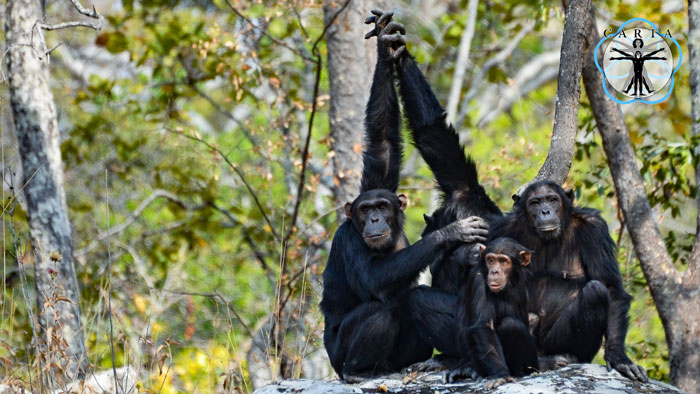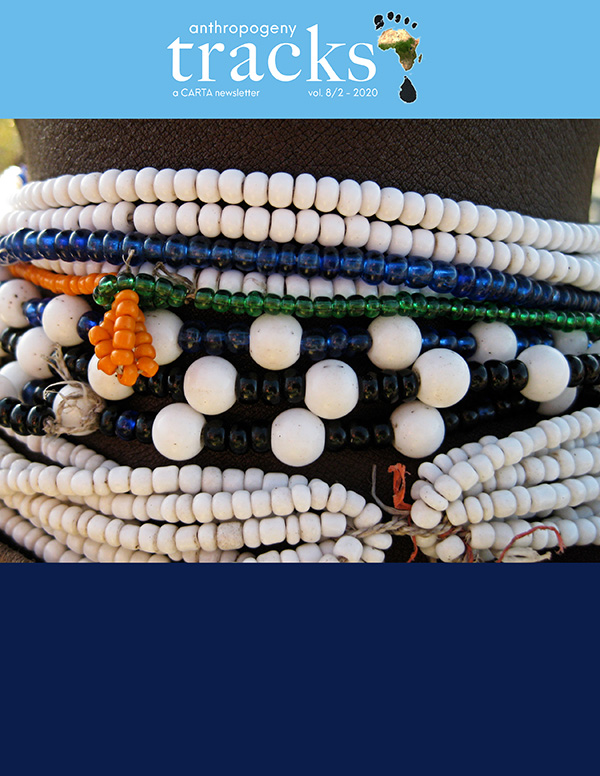
Welcome to the first digital issue of Anthropogeny Tracks!
As in the case of the best-laid plans this year, the CARTA staff also found ourselves adapting our daily work, symposia, and outreach to frequently changing conditions. We thank you for your indulgence as we navigate uncertain waters and refine our offerings to better share CARTA news with you.
For this reason, you will notice some changes to our format and distribution method in this newsletter (and as we continue to experiment), but we assure you that we remain committed to bringing you periodic updates regarding all things CARTA!
"Inside" CARTA's 2020 Year-end Round-up...
- Editor's Letter
- Awards & Honors
- CARTA-Inspired Publications
- Ask an Anthropogeny Expert
- Upcoming CARTA Symposia (2021)
- UCSD Graduate Specialization in Anthropogeny
- Spotlight on: Anthropogeny Education & Teaching Resources
- CARTA Zoom Backgrounds
- Support CARTA
- Follow Us on Social Media
"Mass Extinction Event 5¾": A 2020 Retrospective
From K. Lindsay Hunter (CARTA Community Engagement & Advancement Director)
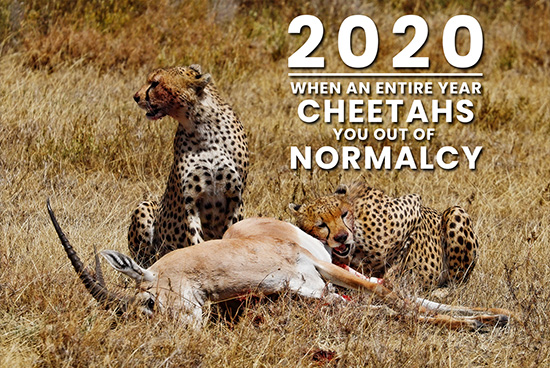
Analogies to Mass Extinction Events are hardly the stuff of most holiday newsletters, though I think that we can all agree that, in terms of recorded human history, 2020 was [insert synonym of choice: unprecedented / unparalleled / incomparable] in many ways, so normal rules may not apply. Not only did 2020 strain hyperbole and credulity, but it was also the source of immense suffering for millions of humans worldwide.
To make some sense of the enormity of the challenges faced, a “Deep Time” perspective might be invoked to highlight our species’ ingenuity and resilience despite its frailty and catastrophic impact on the planet (e.g., the ongoing "Anthropocene Extinction"). Such a macrocosmic view, however, is of little comfort to those individuals represented by dire, yet sterile, statistics. To be both scientifically accurate and objective, while also sensitive and humane, has been a tightrope walked by almost every “doctor” whether that title is conferred by Ph.D. or by medical degree. And it is, perhaps, also emblematic of why we are so interested in this particular naked ape.
2020 extinguished or restrained many long-held and even cherished cultural practices, but the resulting "adaptive radiation" has led us to new or renewed ways of interacting, some of which will persist long past this year and its struggles pass behind the veil of History. For every new challenge and crisis has shown us something fresh about humans, this strange and contradictory creature, whose origins we pursue. Some of this self-knowledge was ugly and terrifying, some of it baffling, but much of it, I would argue, gives us good reason for hope.
From all of us at the Center for Academic Research and Training in Anthropogeny (CARTA), we hope that you will indulge us as we share the following update on explorations of the human phenomenon in this first online issue of Anthropogeny Tracks (Volume 8, Issue 2).
We look forward to having you join us again, healthy and safe, in the new year.
Sincerely,
Lindsay
External Awards & Honors
The following external awards and honors were received by CARTA Members and shared with us since our last newsletter. You may learn more about each CARTA Member by clicking on their name to view their full CARTA profile. To update your own CARTA profile, login to the CARTA website (or create a new account) and click on "My Account" in the navigation.
 |
Katerina Harvati (University of Tübingen) was recently elected President of the European Society for the Study of Human Evolution (ESHE). Prof Harvati was also awarded the Gottfried Wilhelm Leibniz prize by the Deutche Forschugnsgemeinschaft (DFG, German Research Foundation), which is the highest scientific award in Germany. The prize announcements by the DFG and the University of Tübingen. |
 |
Clark Larsen (The Ohio State University) was elected to the American Academy of Arts and Sciences in 2020. |
 |
Carmel O'Shannessy (Australian National University) was awarded the Australian National University Vice Chancellor’s Award for Excellence in Research. |
 |
Rafael Núñez (UC San Diego) and three of his European colleagues were awarded 10 million Euros from the European Research Council to fund a 6-year study of the bio-cultural evolution of quantification. |
 |
Ajit Varki (CARTA co-director, UC San Diego) received the prestigious Rosalind Lornfeld Lifetime Achievement Award from The Society for Glycobiology. |
Graduate Fellowships
It is CARTA's great pleasure to announce the awarding of the Annette Merle-Smith Fellowships and the CARTA Fellowships in Anthropogeny for 2020-21. Congratulations to all our scholars and thank you to our generous sponsors, especially Mrs Annette Merle-Smith, who have made their studies possible! You may learn more about each student by clicking on their name to view their full CARTA profile. To update your own CARTA profile, login to the CARTA website (or create a new account) and click on "My Account" in the navigation.
Read more about the history of these Fellowship Programs and browse our past awardees. We invite you to also learn more about UC San Diego's "Faculty of Anthropogeny," which includes CARTA members and local experts and offers the one-of-a-kind trans-disciplinary Graduate Specialization in Anthropogeny.
2020-2021 Annette Merle-Smith Fellows |
||||
 |
Nico KingVisual Arts
|
 |
Stephan KaufoldCognitive Science |
|
2020-2021 CARTA Fellows |
||||
 |
Jason AdamsNeurosciences
|
 |
Julia AdrianCognitive Science |
|
 |
Tanushree AgrawalPsychology |
 |
James MichaelovCognitive Science |
|
 |
Tim SainburgPsychology |
 |
Anne YilmazPsychology |
|
 |
Matthew ZaslanskyLinguistics |
|||
A fresh selection of CARTA-inspired publications submitted by CARTA Members, which also acknowledge somewhere within the publication CARTA's role in contributing to the research described. CARTA members are listed in bold.
Were you intrigued by Aniruddh Patel (Tufts University)'s talk, "Music and Gene-Culture Coevolution," during CARTA's virtual symposium, Comparative Anthropogeny: Exploring The Human-Ape Paradox on Oct. 24, 2020? Learn more about Prof Patel and his research into the cognitive, neural, and evolutionary foundations of music cognition in his interview published in Current Biology (Volume 30, Issue 23, PR1397-R1399).
Join CARTA in 2021 as we continue our physically distanced, yet engaging, online symposia, during which we explore the origin of humans and the implications for the past, present and future of our species. Detailed event and registration information is provided on each symposium page. All event times are Pacific. Download the 2021 CARTA symposia schedule (PDF).
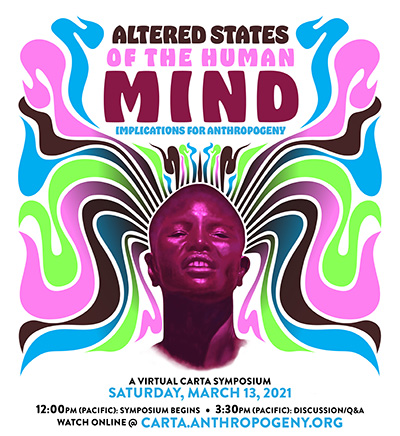
Altered States of the Human Mind
Saturday, March 13, 2021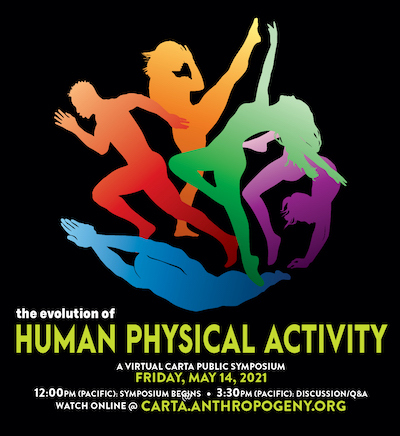
The Evolution of Human Physical Activity
Friday, May 14, 2021
To celebrate the commencement of the Fall Quarter at UC San Diego, CARTA shone a spotlight on the Graduate Specialization Track in Anthropogeny at UC San Diego. In a Fall 2020 "Return to Learn" blog series, five senior Anthropogeny-track graduate students in fields at diverse as Neurosciences, Visual Arts, Linguistics, and Psychology (Machine Learning and Experimental) shared reflections on their CARTA experience.
 |
Reflection from Experimental PsychologyHaleh Yazdi
|
 |
Reflection from PsychologyTim Sainburg |
|
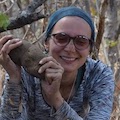 |
Reflection from LinguisticsNina Semushina
|
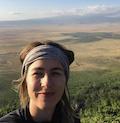 |
Reflection from Visual ArtsVanessa Bateman |
|
 |
Reflection from NeurosciencesCatie Profaci |
Learn more about how joining the Anthropogeny Specialization enriches participating graduate degrees at UC San Diego.
 Osher/CARTA "Master Class I"
Osher/CARTA "Master Class I"
During Fall 2020, UC San Diego CARTA Members Margaret Schoeninger (CARTA Co-Director), Pascal Gagneux (CARTA Associate Director) Patricia Churchland, Federico Rossano, and Ajit Varki (CARTA Co-Director) shared their anthropogeny expertise with the community in the lecture series, "Master Class I," offered through UC San Diego Extension's Osher Lifelong Learning Institute. Check out the linked syllabus for resources and reading list with more session details.
Online Resource for Teaching During COVID-19
Submitted by CARTA Member Carol Ember (Yale University)
CARTA Member Carol Ember (President of the Human Relations Area Files, HRAF) shared, "In response to school closure of many colleges and universities due to the COVID-19 crisis, "HRAF and the transition to remote education: Online anthropology amid #CovidCampus" summarizes the open-access resources available from HRAF that can be used for online learning. In addition, for those institutions that are not members of eHRAF World Cultures or eHRAF Archaeology, we also are offering extended IP trials to both databases through the rest of the semester."
Coursera Class: "Chimpanzee behavior and conservation"
Submitted by CARTA Member Anne Pusey (Duke University)
This free online course offered by Duke University debuted in 2019 and ran during early 2020. The most recent class began on Dec. 14, 2020, and is ongoing.
About the course: "Chimpanzees are one of our closest living relatives, yet almost nothing was known about their behavior in the wild until Jane Goodall started her groundbreaking study of the chimpanzees of Gombe, Tanzania in 1960. This study continues today, following the same chimpanzee families that Jane Goodall first encountered over 55 years ago. Guided by three course instructors (including CARTA Member Anne Pusey, Duke University) who have lived and worked with the Gombe chimpanzees, you will learn how Goodall’s early discoveries changed our view of human uniqueness. By completing the course, you will gain a new appreciation of the deep similarities between chimpanzees and humans in intelligence, tool use, hunting, personality and social relationships, as well as some key differences. You will learn how chimpanzees interact with their environment and how their behavior is influenced by ecology, as well as the severe conservation challenges they face today. And you will employ your new knowledge of chimpanzees to construct a persuasive argument for their protection. This course is open to everyone interested in learning more about these fascinating and complex beings. Knowledge of high-school-level biology is beneficial but not required. Please keep in mind, however, that the content of this course will cover all aspects of chimpanzee life, including scientific discussion of sexual and aggressive behaviors."
Incorporating CARTA Talks in Your Teaching
Submitted by CARTA Member Teresa Steele (UC Davis)
You may be familiar with CARTA's symposia, but have you thought of incorporating them into your teaching? CARTA Member Teresa Steele (UC Davis) reports that she used CARTA talks on the "The Ecology of Hominin Scavenging" (by CARTA Member Briana Pobiner, Smithsonian Institution) and "The Origins of Modern Humans in Africa" (Brenna Henn, Stony Brook University) to support her online teaching of "African Prehistory" during Spring 2020.
As CARTA's holiday gift to you, Program Coordinator, Jesse Robie, has crafted virtual backgrounds from beautiful photographs taken during CARTA's pre-pandemic field courses that you can download for FREE!
Thanks to CARTA staff Linda Nelson, Pascal Gagneux, Jesse Robie, and CARTA students Anupam Garg, Stephan Kaufhold and Megan Kirchgessner, for these images.
CARTA’s quest to explore and explain the human phenomenon is shared by many across the globe, and CARTA connects us all – scientists and philosophers, students and teachers, people with questions and others with answers. Through access to free UCSD-TV broadcasts and archived videos on multiple websites, the global CARTA community grows with each lecture that is experienced and passed forward. Help us preserve this free flow of information about what it means to be human. Consider a donation of $20, $35, $50 or more to keep CARTA’s symposia free to attend and view online.
Click the button below to begin your 100% tax-deductible donation:
Connect via social to CARTA enthusiasts and members around the world.















